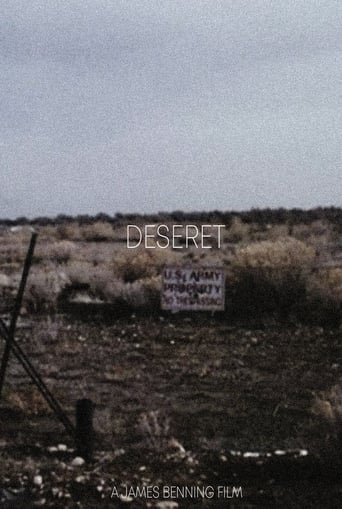David de Jong
I never heard of James Benning or his work, but 'experimental and structuralist' seems to be a quite fitting description to me after watching his 1995 documentary 'Deseret'.The title is the name the Mormons used when applying for statehood in 1849 and it combines images from the territory and articles about the subject from the New York Times starting from its founding (in 1851) onwards to tell it's story.The only reason I watched this movie is because Steven Jay Schneider has this obscure title on his list of 1001 movies 'You Must See Before You Die'. And, although I don't think it's a must see, I can understand why he must have believed he added something special when putting this one on his list.Benning spent 18 months shooting the Utah scenery from a fixed camera-position. The shots he used from all four seasons make for a nice viewing experience and gives it a timeless charm. While watching natures beauty a voice-over reads you a great number of mostly grim stories about the state from clashes between Native Americans and settlers all the way up to incidents with polygamous clans in recent times. The combination of images and sounds are to me a both awkward and fascinating mixture and make the movie worthwhile.All in all, although not entertaining in a conventional, Hollywood kind of way, I found this movie both visually striking and historically interesting: a 6 /10 for me.
runamokprods
So far I've only seen this on YouTube on an awful, faded, scratched and beat up print, so this could well be even better than my reaction. But it's already pretty fascinating. Benning takes striking images of modern day Utah – both landscapes and civilization -- and overlays them with a series of news stories read aloud from The New York Times, following Utah's history from the 1840s to the 1980s. A fascinating history lesson, full of contradictions (e.g. Mormon leaders often come off as monsters, but occasionally seem far more sane and kind than the world around them).The echoes between the images and the history, knowing that the people we're hearing about lived and died on the lands we're looking at make all sorts of poetic connections about the land, the news media, religion, the nature of 'progress'. Never boring, it somehow just missed greatness for me, perhaps because the more emotional layer I kept expecting never quite hit. But if I could see a good print, if those landscapes could show the naked primal beauty I suspect the images have, I have a feeling this could work at yet another level.
